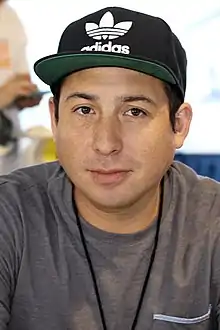Tommy Orange
Tommy Orange (born January 19, 1982) is an American novelist and a writer from Oakland, California. His first book There There was one of the finalists for the 2019 Pulitzer Prize.[1]
Tommy Orange | |
|---|---|
 Orange in 2018 in Texas | |
| Born | January 19, 1982 Oakland, California, U.S. |
| Occupation | Writer |
Orange was also the recipient of 2019 American Book Awards.[2] Orange is a citizen of the Cheyenne and Arapaho Nations of Oklahoma. He attended Institute of American Indian Arts and earned the Masters in Fine Arts. He was born and raised in Diamond District[3] Oakland, California, and resides in Murphys, California, with his wife, Kateri, and his son, Felix.[4]
Early life
Orange was born in Oakland, California on January 19, 1982. He did not always know that he wanted to be a writer. Growing up, he was more into sports than reading in his free time. From ages 14 to 24, Orange played roller hockey on a national level, and was into music at the age of 18. After graduating with a bachelor’s of science in sound arts, he took up a job at a bookstore, Gray Wolf Books, which is where he found his love for reading and then writing.[5]
Education
Orange first attended community college and obtained a bachelor's in audio engineering. Later on in his life, he went to the Institute of American Indian Arts and obtained a Master's of Fine Arts.[6]
Writing career
Growing up, Orange mentions that he did not do well in school and was not necessarily encouraged to read. After graduating from college, he got a job at a bookstore where he developed a passion for reading.[5]
Along with the National Bestseller, Orange has written for Esquire magazine on the profile of an average Native American teen. This article was about 17-year-old Jeffrey Martinez, and what his life is like as a Native American in today’s world. He has also published short stories in literary magazines, McSweeney’s, Zoetrope: All-Story, and Zyzzyva (magazine).[7]
Inspiration for There There
Tommy Orange described that his inspiration for There There came in a single moment. He worked in digital storytelling booth at the Native American Health Center, at Fruitvale and International, and out of a non-profit from Berkeley called Story Center. His role was to staple and make copies of grants, burning sage and sending them off with a prayer.[3] During this time he worked on a storytelling project that led him to realize that the stories of urban Natives needed to be heard, especially by other urban Natives so they would be able "to see their own stories reflected in a bigger way." Orange described that "Native people are pretty invisible" and he wanted to tell a story about a community that people knew too little about. He went on to describe that to hear a story similar to our own is powerful and prevents us from feeling that we do not belong. Orange believes that feeling out of place makes it harder to be a strong human being. It was his goal to expand the range of what it meant to be Native.[5]
Tommy Orange also participated in an episode of The Archive Project at the 2019 Sun Valley Writers' Conference, during which he described that in many ways this book was for his dad and about his dad. Someone, "very secure in their Indianness and doesn’t necessarily teach it to their kids." [8]
Awards & Nominations
Tommy Orange had quite the year in 2019, having been recognized for his writing achievements by winning multiple awards. He had just come off of winning the John Leonard Prize in 2018, awarded for an author’s first book in any genre. He was awarded the PEN/Hemingway Award,[9] which is dedicated to first time authors of full-length fiction books. He was also the recipient of the American Book Award, denoting "outstanding literary achievement".
He also received nominations for various other recognitions, like the Andrew Carnegie Medal for Excellence in Fiction, Pulitzer Prize for Fiction, Audie Award for Multi-voiced Performance, and two from Goodreads Choice Awards: Best Fiction and Best Debut Goodreads Author.
References
- León, Concepción de (2019-04-16). "What Pulitzer Prize-Nominated Books Should You Read First?". The New York Times. ISSN 0362-4331. Retrieved 2019-09-17.
- "Tommy Orange among winners of American Book Award". AP NEWS. 2019-08-19. Retrieved 2019-09-17.
- Chang, Jeff. "TOMMY ORANGE in Conversation with Jeff Chang". City Arts & Lectures. Retrieved 15 November 2020.
- "Meet Tommy Orange". www.diablomag.com. Retrieved 2019-09-17.
- Button, Liz (May 18, 2018). "A Q&A With Tommy Orange, Author of June's #1 Indie Next List Pick". American Booksellers Association. Retrieved November 16, 2020.
- Gross, Joe. "Praise for 'There There' still flowing for debut author Tommy Orange". Austin 360. Retrieved 2020-11-17.
- Ruland, Jim (November 21, 2019). "Tommy Orange adjusts to all the attention as a 'There There' sequel flows along". Los Angeles Times. Retrieved November 16, 2020.
- Proctor, Andrew (July 22, 2019). "Tommy Orange,". Literary Arts. Retrieved November 16, 2020.
- "2019 PEN/Hemingway Winner -Tommy Orange". The Hemingway Society. Retrieved 2020-11-17.
Further reading
- Orange, Tommy (October 29, 2019). "A Letter to Marlon Brando About Putting an Indian on the Oscar Stage". The Nation. Retrieved 30 October 2019.
- Orange, Tommy (November 23, 2017). "Op-Ed: Thanksgiving is a tradition. It's also a lie". The Los Angeles Times. Retrieved 30 October 2019.
External links
 Quotations related to Tommy Orange at Wikiquote
Quotations related to Tommy Orange at Wikiquote